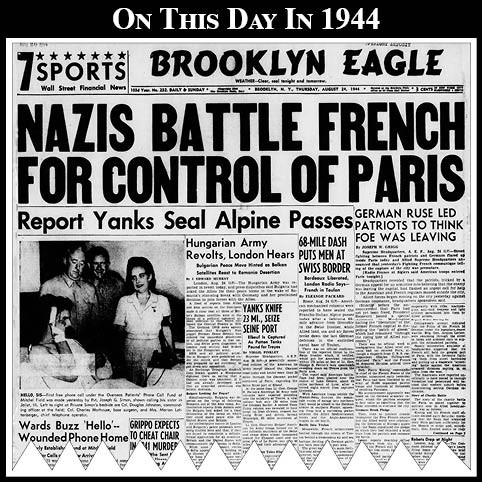August 24: ON THIS DAY in 1944, Nazis battle French for control of Paris

ON THIS DAY IN 1944, the Brooklyn Daily Eagle reported, “Supreme Headquarters, A.E.F., Aug. 24 (UP) — Street fighting between French patriots and Germans flared up inside Paris today and Allied Supreme Headquarters announced that yesterday’s Fighting French communique telling of the capture of the city was premature. [Radio France at Algiers said American troops entered Paris tonight.] Headquarters revealed that the patriots, tricked by a German appeal for an armistice into believing that the enemy was leaving the capital, had flashed an urgent call for help to the American and French regulars massed outside the city. Allied forces began moving on the city yesterday against German resistance, headquarters spokesmen said. (Shortly before the announcement that Paris had not yet been freed, President [Franklin] Roosevelt issued a special statement in Washington hailing the ‘liberation’ of the former French capital as dispelling the ‘patch of gloom’ which had remained ‘through the rising tide of Allied successes.’)”
* * *
ON THIS DAY IN 1898, the Brooklyn Daily Eagle reported, “Troop C of Brooklyn will be ordered home and mustered out at once. Adjutant General Corbin so informed Postmaster Wilson of Brooklyn this morning … Troop C’s war record has been a brief but gallant one … They will no doubt be accorded a warm reception on their return home … Colonel [Theodore] Roosevelt has telegraphed asking that the Rough Riders should be mustered out and his request will in all probability be promptly complied with.”

Brooklyn Boro
View MoreNew York City’s most populous borough, Brooklyn, is home to nearly 2.6 million residents. If Brooklyn were an independent city it would be the fourth largest city in the United States. While Brooklyn has become the epitome of ‘cool and hip’ in recent years, for those that were born here, raised families here and improved communities over the years, Brooklyn has never been ‘uncool’.